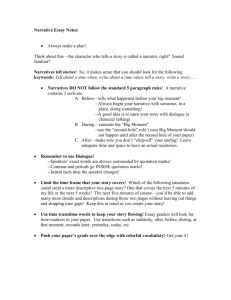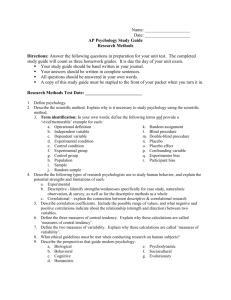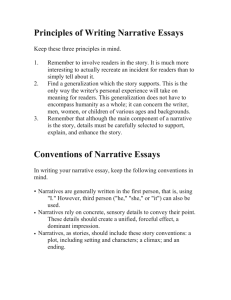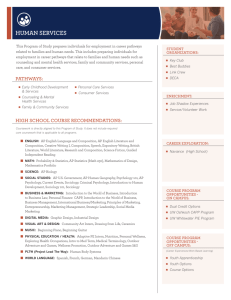WELLNESS WITHIN: Psychology and Health Tracy A. Knight
advertisement
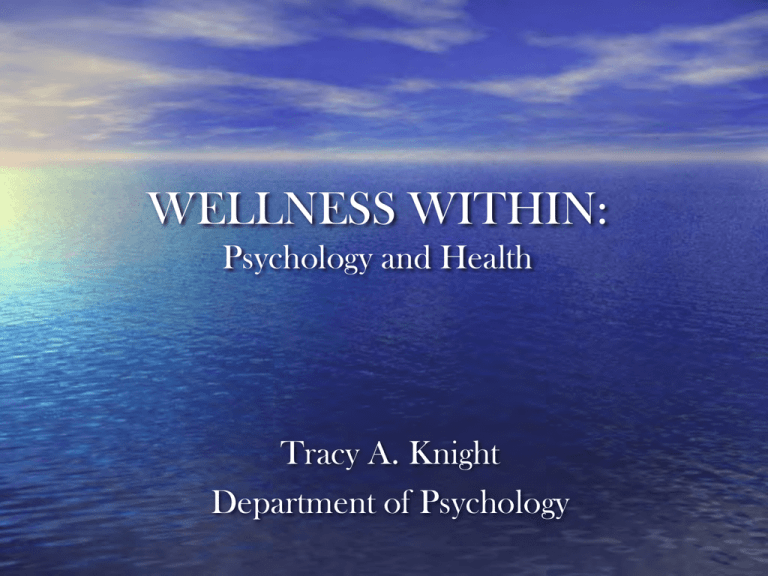
WELLNESS WITHIN: Psychology and Health Tracy A. Knight Department of Psychology INITIAL QuestionS What are the attributes of wellness? How do we know if and when WE ARE well? What is “the good life”? Our Dominant Culture Today Emphasis on consumption/products/services Focus upon pathology/diagnoses/weakness The neglected question: What resources do we already possess that allow us to pursue the good life? Humanistic/Positive Psychology “Symptoms” of Mental Health: Self-Acceptance Personal Growth Purpose in Life Environmental Mastery Autonomy Positive Relations with Others Narrative Psychology A primary focus upon the centrality of human beings’ need to create meaning Using our life experiences, we create meaning in the form of stories “You don’t remember what happened. What you remember becomes what happened.” John Green Our Lives, Our Stories The stories we create from the experiences of our lives consist of: Events/experiences Linked in sequence Across time According to the plot we author (or at least co-author) Examples of Narrative Exercise: Assume (as you legitimately can) that you were born and grew up at the “perfect time.” Provide evidence. What are your narratives of your self? (Write down five adjectives) Do you have any “problem-saturated” narratives? The Effects of Dominant Stories Our dominant stories affect: how we interpret what happens to us what we attend to, what we ignore how we plan and decide our futures Pathways Thinking Refers to viewing ourselves as capable of generating/imagining workable routes to our goals Involves thoughts/images (narratives?) of routes to a desired goal AGENCY THINKING: a motivational component; the perceived capacity to use our pathways to achieve goals Pathways and agency thinking are the manifestations of hope The Placebo Response Rossi (1986) found that there appears to be a 55% placebo response in many, if not all, healing procedures. The placebo response approaches (and often equals) the effectiveness of antidepressant medications No-cebo: Negative effects of expectations The placebo response is pathways thinking, a narrative, imagining a route to our goal of relief Optimism and Pessimism Optimists anticipate the possibility of positive outcomes Pessimists anticipate the possibility of negative outcomes Both are forms of narrative and pathways thinking Perhaps the important distinction is between anticipation and expectation IMAGERY Involves the creation of experience Utilizes the mind-body communication that, while poorly understood, is ever-present in our lives Can be easily tailored What’s the moral of this story? Not to impose an unnatural or “unrealistic” narrative on your life experiences Rather: To recognize the range of experiences available to you To recognize your role as an author and the choices it provides To appreciate your natural abilities to re-author your story, and to positively affect your wellness “I don't want to get to the end of my life and find that I lived just the length of it. I want to have lived the width of it as well.” -- Diane Ackerman “We are asleep with compasses in our hands.” --W. S. Merwin “We are here and now. Further than that, all knowledge is moonshine.” --H.L. Mencken Contact Information: Tracy A. Knight Department of Psychology 134 Waggoner 298-1842 TA-Knight@wiu.edu
